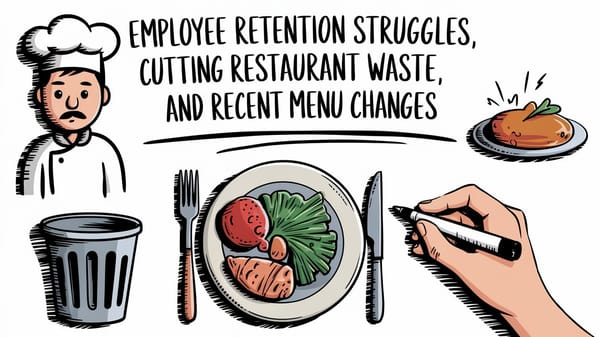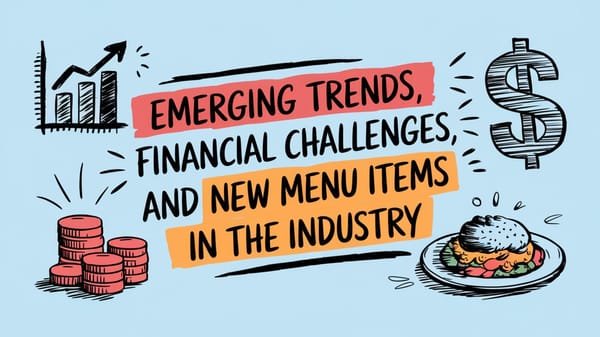February 2nd QSR Roundup: McDonald's Scholarship Program, Impact of Trump's Immigration Plans, and AI Solution for Ingredient Safety

QSR news for Feb 2nd, 2025. We reviewed 21 QSR publications, 6 subreddits, and over 33 articles to bring you the latest. Estimated reading time saved (at 200wpm): 160 minutes. It'll take you only 8 minutes to catch up.
McDonald's Scholarship Revamp and Broader Access
McDonald's has taken a bold step by settling a lawsuit over its HACER program, which originally required recipients to have a Latino or Hispanic parent.
- Program Adjustments: The company is shifting its focus—applicants now need to demonstrate contributions to the Hispanic/Latino community, broadening the eligibility for over 17,000 students who have already benefited from the $33 million scholarship fund.
- Legal and Social Context: This decision comes in the wake of a Supreme Court ruling against affirmative action and heightened scrutiny over corporate diversity, equity, and inclusion (DEI) strategies.
- Key Insight: While McDonald’s disagrees with claims of discrimination, the adaptation reflects an effort to increase access and fairness.
Highlight: This proactive change not only broadens access but also redefines how corporate initiatives address community contributions.
Sources: Restaurant Business
Immigration Policy Shifts and the Agricultural Impact
Recent discussions reveal that Trump's immigration plans could severely destabilize the agricultural industry with grave consequences:
- Labor Shortages: Mass deportations may extract a significant portion of the undocumented workforce (more than 70% of farm labor), which could lead to drastic price hikes and potential supply shocks reminiscent of the COVID-19 period.
- Vulnerability of H-2 Workers: With fewer rights compared to undocumented workers, H-2 visa holders might face exploitation, leading to even greater precarity in the sector.
- Ripple Effect: The agricultural supply chain’s heavy reliance on these workers means that any disruption will likely translate into higher grocery prices for consumers.
Highlight: Stability in labor — especially in critical industries like agriculture — is essential to prevent spiraling food costs and maintain supply chain resilience.
Sources: Salon
Celebrating Culinary Innovation and Black Foodways
Chef Ashleigh Shanti’s recognition by the James Beard Foundation underscores the powerful intersection of creativity and tradition in culinary arts:
- Cultural Celebration: Her restaurant, Good Hot Fish, and her cookbook, "Our South: Black Food Through My Lens," celebrate rich Black culinary traditions, linking history with modern innovation.
- Inspirational Journey: From her "Top Chef" days to achieving prestigious nominations, Shanti’s narrative highlights the evolution of flavor and identity in the culinary world.
- Historical Roots: Inspired by trailblazing figures like Malinda Russell, her work is both a homage and a fresh interpretation of enduring food cultures.
Highlight: Chef Shanti’s journey reminds us that culinary art is as much about heritage as it is about innovation and personal transformation.
Sources: Salon
Innovative Manufacturing: Smart Factories and AI in Food Production
The food industry is witnessing revolutionary advances aimed at efficiency and safety:
- Nulogy’s Smart Factory: This breakthrough offers manufacturers real-time production insights using automated data capture, significantly reducing downtime while increasing operational effectiveness.
- AI-Driven Ingredient Safety – NobleAI's RAIR: By embracing integrated AI solutions, companies can now assess and replace hazardous ingredients in minutes—a process that traditionally took months—ensuring improved regulatory compliance and maintaining product integrity.
- Data Visibility: Both innovations underscore the importance of leveraging technology to enable data-driven decision-making and enhance overall production workflows.
Highlight: These technological solutions pave the way for a smarter, more efficient manufacturing landscape, contributing to safe and resilient supply chains.
Sources: Food Industry Executive; Food Industry Executive
Revolutionizing Bread Freshness and Shelf Life
Innovative breakthroughs in food technology are extending the product life cycle in the bakery sector:
- LEVAIR® ESL for Bread: Developed by Innophos, this technology effectively slows microbial growth without compromising freshness, enabling bakeries to streamline production and reduce waste.
- Operational Efficiency: As bakeries centralize inventory, they not only cut down on wasted resources but also improve overall profitability, which is crucial in today’s competitive market.
- Sustainability: Reduced waste and better distribution underline the environmental benefits alongside improved economic outcomes.
Highlight: This innovation demonstrates how science-backed solutions can drive both profitability and sustainability in food production.
Sources: Food Industry Executive
Biosecurity and Health Management in Poultry
Webinars and expert sessions are turning the spotlight on essential biosecurity measures in poultry operations:
- Key Discussions: Industry experts like Dr. Jeroen Dewulf and Dr. Morgan Farnell share effective strategies to bolster flock health, from auditing tools to selecting the right disinfectants.
- Practical Advice: The session equips poultry operators with actionable steps to manage and reduce disease risks, ensuring better productivity and sustainability in their operations.
- Enhanced Livability: By focusing on strong biosecurity practices, poultry farms can achieve a healthier and more resilient production environment.
Highlight: Army-level preparedness in biosecurity can transform poultry management, safeguarding both animal health and business viability.
Sources: Food Industry Executive
Employee Food Perks and Shift Meal Policies in Restaurants
Insights from restaurant owners reveal a keen focus on enhancing staff welfare through innovative meal policies:
- Shift Meals Variations: Restaurants are experimenting with different discount models—half-off meals during shifts, 25% off off-duty, and even free shift drinks.
- Employee Morale: Shared experiences highlight that providing food not only boosts morale but also reduces operational mistakes, as well-fed employees tend to perform better.
- Operational Challenges: While many applaud these perks, enforcing fair policies, particularly in busy kitchen environments, remains a challenge.
Highlight: Balancing cost with care for employees is crucial; a well-fed team is a productive team, ensuring smoother operation and better service.
Sources: /r/restaurantowners; /r/restaurantowners
Entrepreneurial Journeys in the Restaurant Industry
Several posts illustrate the challenges and triumphs of owning and operating restaurants:
- Success Stories: Entrepreneurs have transformed failing establishments into profitable ventures by focusing on hard work, strategic marketing, and community engagement—one owner scaled revenue from $250k to $800k within two years.
- Real-World Struggles: Conversely, other posts caution against the ease of restaurant ownership. High failure rates, financial mismanagement, and the steep learning curve abound, stressing the need for proper business acumen rather than just culinary expertise.
- Scaling Challenges: Whether it’s the hesitance to transition from small-scale operation to food trucks or dhabas, or the critical decision of closing a struggling restaurant under a burdensome lease, the entrepreneurial path in the food service industry is fraught with tough decisions.
Highlight: The restaurant business demands persistent effort, strategic planning, and a clear understanding of market demands to succeed in a competitive landscape.
Sources: /r/restaurantowners; /r/restaurantowners; /r/restaurantowners
Operational and Financial Challenges in Real-Time
Dynamic discussions on platforms like /r/restaurantowners and /r/Restaurant_Managers shed light on everyday challenges faced by food service professionals:
- Electricity Scam Alerts: Multiple posts highlight recurring scams where restaurant owners receive threatening calls about electricity disconnections—a scheme aimed at obtaining payment via gift cards. Humor and shared tactics to waste scammers’ time are common, illustrating a unique way to cope with these persistent schemes.
- Handling Bad Reviews on GMB: Managers discuss best practices for transforming negative reviews into opportunities by encouraging positive feedback through QR codes, incentives, and active customer engagement.
- Balancing Menu Timing and Service: Concerns over late menu finalizations for large party reservations and the importance of proactive communication to enhance customer satisfaction also feature prominently.
- Supporting Service Teams: Ideas for boosting support for front-line staff—ranging from fair tip distribution and effective table touches to behind-the-scenes assistance—demonstrate a clear focus on maintaining a harmonious and responsive workplace environment.
Highlight: These real-life operational insights underscore that attentive management and proactive problem-solving are essential for success in the high-pressure restaurant industry.
Sources: /r/restaurantowners; /r/Restaurant_Managers
Fast Food Trends and Menu Inspirations
The fast food landscape remains as vibrant as ever, with discussions ranging from menu innovations to secret items:
- Wendy’s T-Rex on the Secret Menu: Rumors about a nine-patty behemoth have fast food fans divided—some celebrate it as a formidable indulgence, while others dismiss it as an overhyped marketing stunt.
- Starbucks Breakfast Sandwich Experiences: Opinions vary widely, with some celebrating unique creations like the bacon croissant spiced with sriracha, while others lament a lack of freshness in pre-made items compared to classic offerings like the Egg McMuffin.
- The Peanut Strategy at Five Guys: An amusing yet effective tactic—complimentary peanuts keep customers occupied and underscore a light-hearted approach to customer service in the fast food realm.
Highlight: Whether it’s a secret mega burger or the simple pleasure of free peanuts, these trends illustrate the fast food industry’s ongoing efforts to innovate and entertain.
Sources: /r/fastfood; /r/fastfood
Economic Pressures: Tariffs and Distributor Dynamics
Recent discussions highlight economic forces affecting pricing and operational decisions in the hospitality sector:
- Tariff Implications: Tariffs are creating a sense of urgency and concern among restaurant owners. With predictions of significant cost hikes for essentials, there’s mounting worry that prices for items like chicken could double, reminiscent of the 2008 financial crisis scenarios.
- Distributor Challenges: Sudden spikes in order minimums and inconsistent delivery practices force bar owners to reconsider their supplier relationships, underscoring the fragile balance between cost control and operational efficiency.
- Market Adaptations: Commenters on these topics consistently suggest that businesses must revise menus and negotiate better terms to manage these external pressures effectively.
Highlight: Navigating tariff-induced cost pressures and distributor challenges requires agile thinking and a proactive approach to safeguard profitability in an unpredictable market.
Sources: /r/restaurant; /r/restaurant; /r/BarOwners
Bar Ownership and Point-of-Sale Innovations
Discussions in bar and restaurant owner communities reveal key insights into the operational improvements and financial strategies needed for success:
- POS System Versus Traditional Cash Registers: New bar owners are weighing the benefits of modern POS systems over outdated cash registers. Modern systems like Square and Clover offer increased efficiency in handling tabs and reducing workplace theft, making them a popular choice.
- Tips Distribution and Staffing Models: Innovative staffing adjustments—such as pooling tips, adjusting server-to-customer ratios, and improving staff training on upselling—highlight creative solutions to long-standing operational challenges.
- Liquor License Investments: An intriguing case from Idaho illustrates the high stakes involved in acquiring legacy liquor licenses. With transfer fees soaring and regulatory hurdles in place, many see such investments as pivotal for future profitability despite the upfront costs.
Highlight: Embracing technology and smart financial decisions are indispensable for contemporary bar owners, turning everyday challenges into opportunities for operational excellence.
Sources: /r/BarOwners; /r/BarOwners
Stay tuned for more concise news updates delivered right to your fingertips, saving you valuable time. As industry professionals and restaurant operators, your time is precious—spent on running your businesses, innovating menus, and enhancing customer experiences. Let us keep you informed with quick, comprehensive summaries so you can focus on what you do best. Subscribe now and join us again for the latest insights in the restaurant industry!




